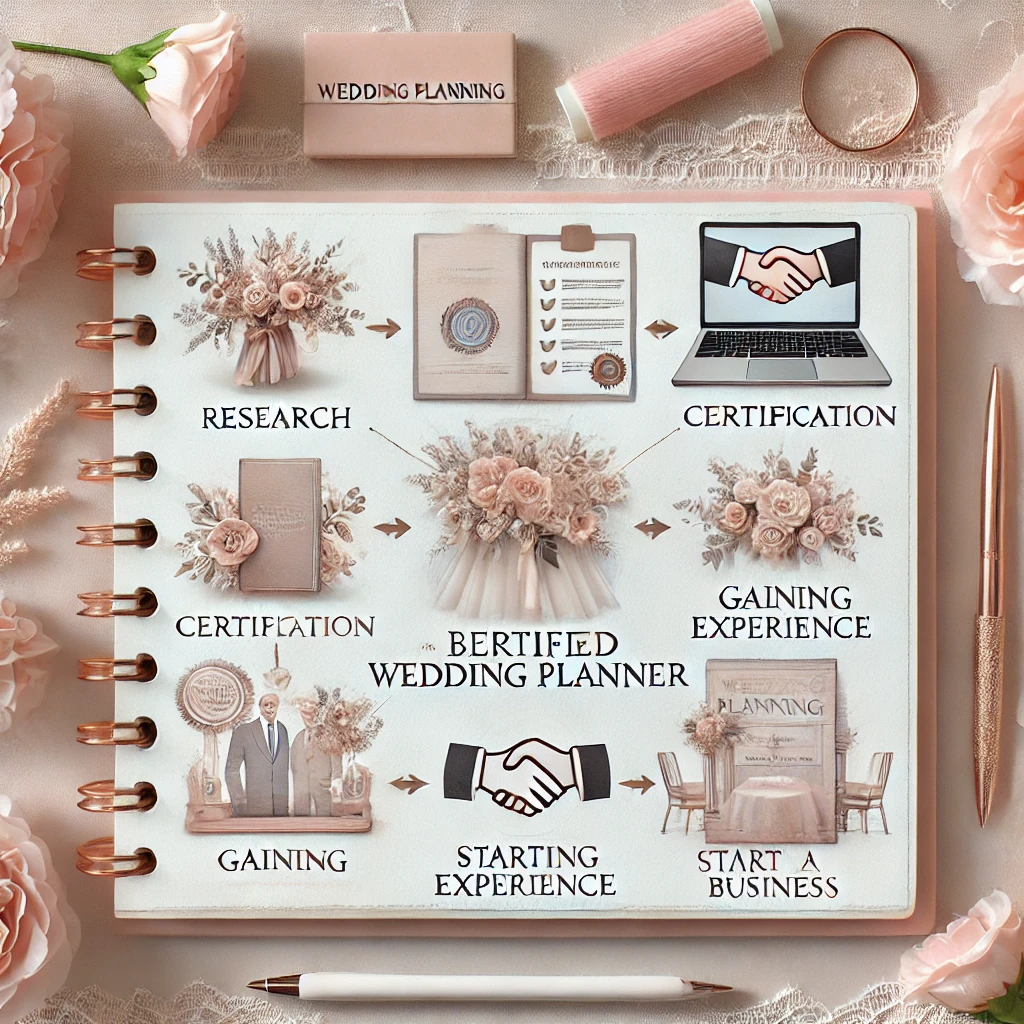Wedding planning is a booming industry, and there is no better time to become a certified wedding planner. With the right training and certification, you can turn your passion for weddings into a successful career.
The wedding industry is growing rapidly, and certified wedding planners are in high demand. Certification not only boosts credibility but also helps you stand out in a competitive market. In this blog, we’ll guide you through five easy steps to become a certified wedding planner.
Step 1: Understand the Role of a Wedding Planner
Before diving into certification, it’s crucial to understand what a wedding planner does. Wedding planners are responsible for managing every aspect of a wedding, including:
- Budgeting
- Vendor coordination
- Logistics
- Creative planning
- Problem-solving
To succeed, wedding planners need strong organizational, communication, and problem-solving skills. Creativity and the ability to work under pressure are also critical traits.
Step 2: Research Wedding Planning Certification Programs
Several certification programs can help you become a certified wedding planner. These programs vary in terms of curriculum, cost, and accreditation, so it’s important to research and choose the one that aligns with your goals.
Here are some popular wedding planning certification programs:
The Wedding Planning Institute (LWPI): This program offers a comprehensive online course that covers wedding planning fundamentals, budgeting, and vendor management. LWPI is widely recognized in the industry and provides access to a network of professionals.
The Bridal Society: A well-known and respected certification program that offers online training and a strong support network. The Bridal Society provides lifetime access to training materials and resources.
The Association of Certified Professional Wedding Consultants (ACPWC): This program focuses on professionalism and ethics in wedding planning. ACPWC certification is respected by many industry professionals.
Wedding Academy Global: With options for both online and in-person learning, Wedding Academy Global offers certifications in wedding planning, styling, and design. The program provides students with valuable industry insights and practical experience.
Important Considerations:
Accreditation: Ensure that the certification program is accredited by a recognized body in the wedding or event planning industry.
Cost: Certification programs can range from a few hundred to several thousand dollars. Consider your budget when choosing a program.
Flexibility: Online programs offer the flexibility to study at your own pace, which is ideal for those balancing other commitments.
Step 3: Enroll in a Certification Program
Once you’ve selected the right program, it’s time to enroll and begin your formal education in wedding planning. Most certification programs cover the following key topics:
Introduction to Wedding Planning: Understanding the basics of wedding planning, industry trends, and client expectations.
Client Management: Building strong relationships with clients, understanding their needs, and managing expectations.
Budgeting and Contracts: Learning how to create realistic budgets, negotiate with vendors, and draft contracts.
Wedding Day Logistics: Handling timelines, managing vendors, and ensuring everything runs smoothly on the wedding day.
Design and Styling: Helping clients choose wedding themes, decor, and other visual elements.
Certification programs typically involve a combination of online learning, reading materials, and practical exercises. Some programs may also offer internship opportunities to gain hands-on experience.
Step 4: Gain Practical Experience
While certification is valuable, gaining practical experience is essential for becoming a successful wedding planner. Consider the following ways to gain experience:
Internships: Many certification programs offer internship placements with established wedding planners. This allows you to work on real weddings and gain firsthand experience.
Volunteering: Offer to help friends or family members plan their weddings. This will give you an opportunity to apply your skills and build your portfolio.
Assistant Roles: Look for assistant roles with established wedding planners or event coordinators. Assisting professionals will allow you to learn the ins and outs of wedding planning from experienced mentors.
Networking: Attend industry events, bridal expos, and wedding trade shows to connect with other wedding planners and vendors. Building a strong network is crucial for success in the wedding industry.
Building a Portfolio: As you gain experience, start building a portfolio showcasing your work. Include photos, testimonials, and examples of wedding planning projects you’ve been involved in. A strong portfolio is key to attracting potential clients.
Step 5: Start Your Wedding Planning Business or Join an Agency
Once you’ve obtained certification and gained some practical experience, you can either start your own wedding planning business or join an established wedding planning agency. Each option has its pros and cons:
Starting Your Own Business: If you have an entrepreneurial spirit, starting your own wedding planning business gives you complete control over your career. You’ll be responsible for marketing, client acquisition, and managing all aspects of the business.
Joining an Agency: Working for an established wedding planning agency can provide job stability and access to a client base right away. You’ll also benefit from working with a team and learning from seasoned professionals.
Regardless of the path you choose, marketing is essential for success. Here are some marketing strategies to consider:
Build a Website: A professional website is crucial for showcasing your portfolio and attracting clients. Ensure your website is SEO-friendly and highlights your services, certifications, and experience.
Social Media Marketing: Utilize platforms like Instagram, Pinterest, and Facebook to share your work, wedding planning tips, and client testimonials. Social media is a powerful tool for reaching brides and grooms.
Networking with Vendors: Building strong relationships with wedding vendors (florists, photographers, venues) can lead to referrals and collaborations. Attend local wedding industry events and become an active part of the community.
Client Referrals: Happy clients are your best marketing tool. Encourage satisfied clients to leave reviews on platforms like Google My Business and The Knot. Word-of-mouth referrals can significantly boost your business.
Frequently Asked Questions (FAQs)
Do I need a certification to become a wedding planner?
While certification is not legally required, it adds credibility to your name, sets you apart from competitors, and provides valuable knowledge to succeed in the industry.
How long does it take to become a certified wedding planner?
The time varies depending on the certification program. Most courses take 6 to 12 months to complete, but some can be completed faster, depending on the pace you set for yourself.
Can I become a wedding planner without experience?
While it’s possible to start a wedding planning career without experience, gaining practical experience through internships or volunteering will significantly improve your chances of success.
How much does wedding planner certification cost?
Certification programs range from a few hundred to a few thousand dollars. Choose a program that fits your budget and career goals.
What are the most important skills for a wedding planner?
Organizational skills, creativity, problem-solving, communication, and the ability to work under pressure are crucial skills for wedding planners.
If you’re planning a wedding and searching for the perfect venue in Delhi, look no further! Saroj Jain Vatika, our spacious and beautifully designed farmhouse, is ideal for weddings, receptions, and other special events. With lush green landscapes, modern amenities, and ample space for your guests, it’s the perfect setting for your big day. For inquiries and bookings, please contact us today to make your dream wedding come to life!





